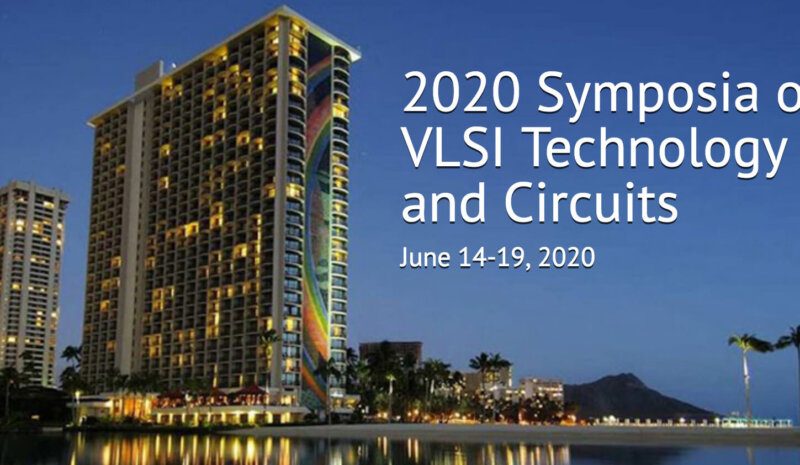The 2020 Symposia on VLSI Technology & Circuits is looking to the future of microelectronics, with the theme “The Next 40 Years of VLSI for Ubiquitous Intelligence.” Presented for the first time as a virtual conference, from June 15th – 18th, 2020, the Symposia provide a unique opportunity for interaction between device technologists and circuit/systems designers in the emerging fields of machine learning, IoT, artificial intelligence, wearable/implantable biomedical applications, big data, cloud/edge computing, robotics, and autonomous vehicles.
The virtual conference program will feature of technical presentations, plenary sessions, panel discussions, joint focus sessions, and Short Courses presented in an online format.
Plenary Sessions (June 15 & 17)
The Symposia will have two Technology plenary sessions. The first session on June 15th will include “5G Evolution and 6G,” by Takehiro Nakamura, senior vice president & general manager of 5G Laboratories, NTT DOCOMO, and “Silicon is Greener: Why Innovation in Circuits is Needed for Sustainability,” by Jen Lloyd, vice president for the Precision Technology & Platforms Group, Analog Devices.
The second plenary session on June 17th will include “The Future of Compute: How the Data Transformation is Reshaping VLSI,” by Michael C. Mayberry, chief technology officer at Intel Corporation, and “Empowering Next-Generation Applications through FLASH Innovation” by Shigeo (Jeff) Ohshima, technology executive at KIOXIA (formerly Toshiba Memory).
Joint Focus Sessions
The ongoing integration of Symposia program elements include a series of joint focus sessions to present contributed papers from the Technology and Circuits programs. Topics will include: “Silicon Photonics,” “5G / mm-wave,” “System-Technology Co-Optimization (STCO) / Design-Technology Co-Optimization (DTCO),” and “MRAM Future – Opportunities Beyond Spin-Torque Transfer (STT).”
Panel Sessions (June 16 & 18)
The Technology panel discussion on June 16th, moderated by Gary Bronner, Rambus, addresses the question: “Memory & Logic Technology Divergence: Will AI/ML Bring Them Back Together?
The topic of the Circuits evening panel session, held on June 18th, is “Human vs. Machine: The Future Role of AI/Machine Learning in Circuit Design.”
Thursday Luncheon (June 18):
The Thursday luncheon program continues the Symposia’s tradition of thought-provoking presentations centered around the conference theme.
Short Courses (June 15):
Two Technology Short Courses are planned – The first, “Future of Scaling for Logic & Memory” will cover a range of topics, including nanosheet transistors, on-die interconnect challenges, a review of previous memory scaling challenges, ferroelectric hafnium oxide applications in memory, and the use of EUV lithography.
The second Technology Short Course, entitled “More than Moore,” will address emerging technologies for TSV-free monolithic 3D ICs, in-situ BELO transistors and oxides, and layer transfer technologies for heterogeneous integration.
The Circuits Short Course – “Trends & Advancement in Circuit Design” will address a variety of topics, including topologies of switched capacitor converters, noise-shaping SAR ADC techniques, next-generation resistor-based sensors, time reference & frequency generation, ultra-miniaturized wireless transceiver IC design, high speed serial links for high-density I/O applications, and design considerations for emerging memories & in-memory computing.
A Joint Technology/Circuits Short Course features “Heterogeneous Integration – To Boldly Go Where No Moore Has Gone Before,” covering a range of topics, including chiplet design benefits & limitations, heterogeneous system partitioning, back-end (OSAT) 2.5D/3D solutions, heterogeneous integration for AI, 3D packaging for MEMS & sensors, I/O circuits, tools & flows, and design strategies for memories.
Demonstration Session
The popular demonstration session will be an on-demand pre-recorded video session. All the accepted demonstration videos are presented online, and viewers can click through them and post comments, enabling interaction between the authors and virtual attendees.
“Friday” Forum (June 17):
The Symposia program will include a virtual forum session (formerly known as the Friday Forum) – a series of presentations focusing on “Technologies & Circuits for Edge Intelligence,” led by experts in the field who will help guide participants in discussions on the contributions of technology and circuits needed to drive the future of advanced edge computing.
Workshops (June 16 & 17)
Held before the main Symposia technical sessions begin, these workshops provide additional learning opportunities for participants. Topics of the workshops include:
• “Know Where You Are Going: Metrology in the New Age of Semiconductor Manufacturing”
• “Analog Computing Technologies & Circuits for Efficient Machine Learning Hardware”
• “Quantum Computing: Maximizing the Impact of the Semiconductor Industry”
Further Information and Registration
Visit: http://www.vlsisymposium.org.





